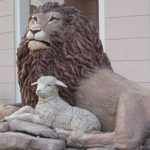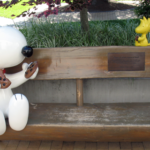One of the stereotypes of small-town communities is they are closed off to outsiders. Of course, the truth about some stereotypes is there is a kernel of truth in them.
 Jonathan DavisWhen moving to a small town, many quickly find out they are “come-heres,” a designation permanently marking them as outsiders, or at least second-class opinion-holders. “Come-heres” may have moved to the area 20 or 30 years ago, yet they still are not fully viewed as members of the community.
Jonathan DavisWhen moving to a small town, many quickly find out they are “come-heres,” a designation permanently marking them as outsiders, or at least second-class opinion-holders. “Come-heres” may have moved to the area 20 or 30 years ago, yet they still are not fully viewed as members of the community.
“Been-heres” are people who are not “come-heres,” and the distinction is self-explanatory. In rural communities, there are understandably competing visions economically, politically and culturally among residents born and raised in the town/county and those who migrate from more urban areas.
I remember moving to a small town in ninth grade. It quickly became obvious I was a “come-here.” Many people who grew up in the town treated my family with suspicion and caution. We felt unwelcome. To this day, I remember a deep sense of exclusion and times I was mistreated because of my “come-here” status.
Competition vs. love
Every small-town church should ask: Can the kingdom of God accommodate a “been-heres” vs. “come-heres” mentality?
Theologian and civil rights leader Howard Thurman once stated, “Community cannot for long feed on itself; it can only flourish with the coming of others from beyond, their unknown and undiscovered brothers.”
When we become insular and inwardly focused, we feed on ourselves. Feeding on self eventually becomes cannibalistic, like when churches compete for members and programs instead of partnering. Or when a church splits because a few pillar members oppose a less top-down ministry strategy because it might diminish their control of the congregation.
The Body of Christ should feed on Christ’s extravagant love, on God’s vision for a more inclusive community and on Christ’s call to help bring the kingdom of heaven to earth.
Sign up for our weekly edition and get all our headlines in your inbox on Thursdays
Feeding on the Triune God is far superior to feeding off congregational ego, pride, attachment to the way things used to be, or even the idea that “our church is friendly enough.” The first way of being church nourishes God’s vision for our congregations; the second nurses our own. This raises other questions.
Feeding, binding
What feeds your church? Anxiety? Pet programs? Nostalgia? Power? Unknown and undiscovered people? An unquenchable desire to model true Christian community in the community where God plants you?
Drama existed in the early church between “been-heres” (Jewish believers) and “come-heres” (Gentiles). Paul wrote to the Galatians, “As many of you as were baptized into Christ have clothed yourselves with Christ. There is no longer Jew or Greek, there is no longer slave or free, there is no longer male and female; for all of you are one in Christ Jesus. And if you belong to Christ, then you are Abraham’s offspring, heirs according to the promise” (Galatians 3:27-29).
If Paul wrote to small-town churches today, he might say: “Our baptism and our identity in Christ are what bind us. There are no longer ‘been-heres’ and ‘come-heres’. There is no longer rural purity and urban decadence. There is no longer farmer and welfare recipient, no longer ‘ideal family’ and single-parent-household, no longer white churches and non-white churches; for all of you are one in Christ Jesus. And that makes you family with a common lineage through God.”
Challenging task
Not making distinctions in the body of Christ based on social norms, expectations and traditions is challenging no matter where you live, but especially if you live in a small town.
Sociologically, there is less to set people apart from one another in small towns—fewer distinguishing markers. Lack of diversity in small towns often leads people to more intensely focus on things that make them different from others as a way to create social, moral and economic capital. “Don’t do business with that new restaurant. The owners aren’t from around here,” or “I hear they’re on food stamps.”
We should be careful not to let our fear of the other or our need for control be couched as “love for community.” A pious—maybe even self-confident—leader was once surprised by Jesus’s answer to the question, “Who is my neighbor?”
When we focus on our differences to nurse pride and ensure security, do we reflect the mind of Christ?
Does your community distinguish between “been-heres” and “come-heres”? Does your church? What would it look like to break the stereotype, embracing the kingdom idea that we exist as a new family established by God, instead of focusing on our differences?
Jonathan Davis is pastor of Urbanna Baptist Church, in Urbanna, Va. He is a doctor of ministry candidate at Logdson Seminary, where his research focuses on equipping small-town churches for 21st century ministry. He is the founder of the Small Town Churches Network, which is dedicated to sharing research, ideas and tools to help small-town churches. Follow him on Twitter @jonathandavis_.














We seek to connect God’s story and God’s people around the world. To learn more about God’s story, click here.
Send comments and feedback to Eric Black, our editor. For comments to be published, please specify “letter to the editor.” Maximum length for publication is 300 words.